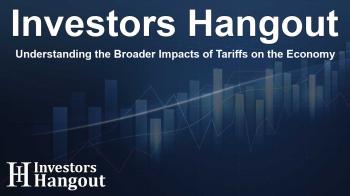Understanding the Broader Impacts of Tariffs on the Economy

Tariff Impacts: Analyzing Mohamed A. El-Erian's Insights
Consumers have, up until now, remained relatively insulated from immediate price increases due to a new round of U.S. tariffs. However, noted economist Mohamed A. El-Erian warns that a time of reckoning may soon be upon us. The repercussions of these tariffs could unfold in unexpected ways across the economy.
Understanding Consumer Price Dynamics
In recent analysis, El-Erian posits that the real implications of the tariffs—a phenomenon some critics describe as a direct "tax" on Americans—have not been avoided but merely postponed. The fallout is expected to manifest unevenly across different sectors of the economy.
A key question arises when examining the new tariffs: Why have we not yet witnessed a broad increase in consumer prices? El-Erian indicates that strategic decisions by corporations and their inventory management have created an interim safety net.
How Corporations Mitigate Tariff Costs
Many foreign suppliers and U.S. importers initially opted to absorb the costs associated with tariffs within their profit margins. This strategic move aimed to retain market share, especially under the assumption that these tariffs were a temporary measure. Such steps have provided a preliminary cushion for American consumers.
Additionally, numerous companies stockpiled imported goods before tariffs gained effect, enabling them to sell their products at stable prices for a more extended duration. This behavioral pattern has further obscured the primary inflationary risks tied to the tariffs.
The Long-Term Tax Implications of Tariffs
El-Erian's perspective presents a more granular timeline regarding observations made by various commentators, including investor Ross Gerber. He noted tariffs operate as a "consumption-based tax," diverging from the original intention of fostering domestic manufacturing renaissance.
Other experts have echoed similar sentiments. Kevin O'Leary highlighted that these tariffs effectively serve as a value-added tax on consumers, reinforcing the narrative that the economic burden of these tariffs may not be consistently distributed. The ramifications could vary significantly depending on the type of commodities consumers choose to purchase.
Understanding Demand Elasticity
El-Erian explains that businesses dealing in products with "inelastic demand," meaning essential goods that people purchase regardless of price hikes, would most likely transfer the full impact of tariffs to consumers. Conversely, companies catering to lower-income groups or offering products characterized by "elastic demand" will face tough decisions. Significant price increases could drastically diminish their sales.
This scenario leads to a complex economic landscape where the effects of tariffs could differ across various sectors, brands, and even specific products. El-Erian suggests that we could see a patchwork of price adjustments as the tariffs unfold over time.
Market Reactions to Tariff Policies
The market has shown varied responses amidst these tariff discussions. The SPDR S&P 500 ETF Trust (SPY) and Invesco QQQ Trust ETF (QQQ), which follow the performance of leading stock indices, displayed gains in premarket trading sessions recently. The SPY price moved up by 0.19%, reaching $636.74, while QQQ saw a marginal rise of 0.089%, landing at $563.78.
FAQs
What are the main concerns regarding the new U.S. tariffs?
The main issues revolve around potential price increases for consumers and how unevenly these costs will be distributed across different sectors.
Why have consumers not felt the impact of tariffs yet?
Many companies chose to absorb costs initially and stockpiled inventory, delaying the transfer of costs to consumers.
What insights did Mohamed A. El-Erian provide about these tariffs?
El-Erian suggested that the effects of tariffs act as a deferred tax impact on consumers rather than an immediate price increase.
How do tariffs affect different types of products?
Elective purchases face price sensitivity, while essential items may see full cost passthrough to consumers based on demand elasticity.
What has been the market reaction to these tariffs?
Stock indices like SPY and QQQ have seen modest increases, reflecting cautious market optimism amid ongoing economic policy discussions.
About The Author
Contact Kelly Martin privately here. Or send an email with ATTN: Kelly Martin as the subject to contact@investorshangout.com.
About Investors Hangout
Investors Hangout is a leading online stock forum for financial discussion and learning, offering a wide range of free tools and resources. It draws in traders of all levels, who exchange market knowledge, investigate trading tactics, and keep an eye on industry developments in real time. Featuring financial articles, stock message boards, quotes, charts, company profiles, and live news updates. Through cooperative learning and a wealth of informational resources, it helps users from novices creating their first portfolios to experts honing their techniques. Join Investors Hangout today: https://investorshangout.com/
The content of this article is based on factual, publicly available information and does not represent legal, financial, or investment advice. Investors Hangout does not offer financial advice, and the author is not a licensed financial advisor. Consult a qualified advisor before making any financial or investment decisions based on this article. This article should not be considered advice to purchase, sell, or hold any securities or other investments. If any of the material provided here is inaccurate, please contact us for corrections.

